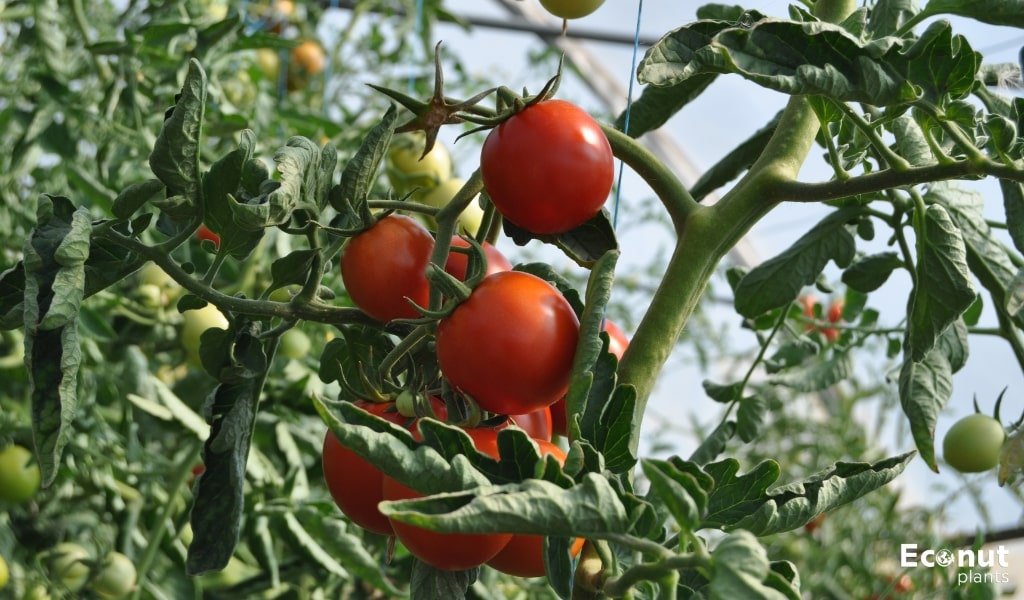Tomato Coffee’ S Grounds make excellent mulch that is high in nutrients for the garden. Given that tomato plants prefer somewhat acidic soil, coffee grounds can aid in achieving the ideal pH balance while producing tomatoes.
This tomato season, are you considering covering your tomatoes with coffee grounds but are unsure if doing so will help the tomatoes grow? This article discusses whether or not coffee grounds are safe to use with tomatoes, as well as any alternatives.
They Acidify Soil
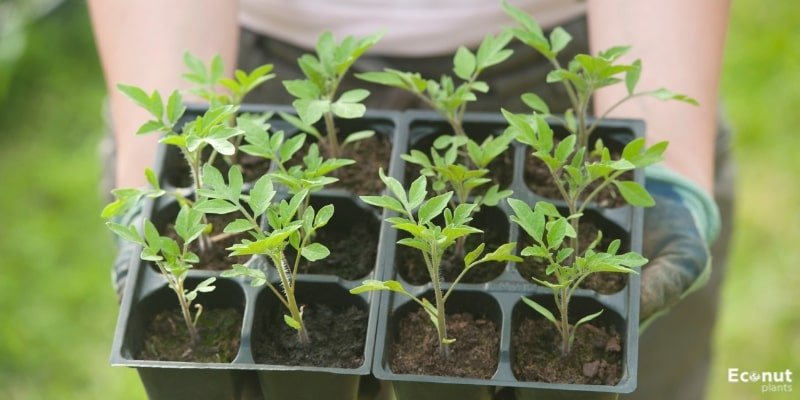
It’s a common misconception—possibly the second most common—to add coffee grinds to your tomato plants. For tomatoes, a slightly acidic climate is good. Six to 6.5 is the ideal pH range for them.
You can quickly test your soil at home with soil test strips or a pH meter to find its natural pH. Use of a soil acidifier is necessary if your soil is excessively alkaline. Unfortunately, they are believed to be acidic and have a more neutral pH.
Adds Nutrients to Your Tomatoes
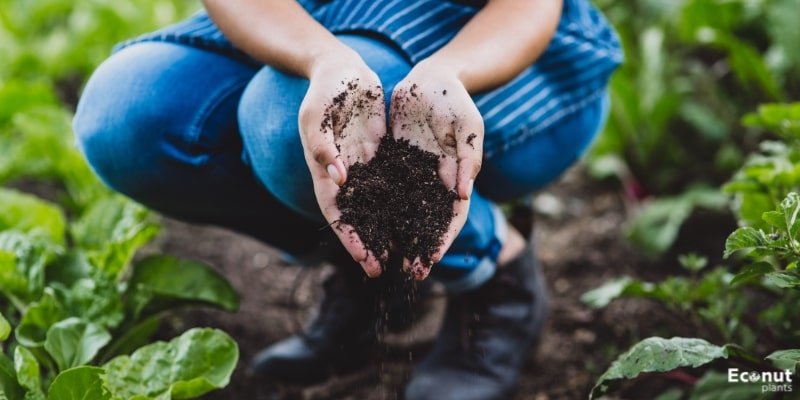
This is the most often-said statement about using coffee grounds in your garden. Coffee grinds have trace amounts of potassium and phosphate and around 2% nitrogen. It makes sense that several people believe coffee to be an excellent slow-release fertilizer for tomatoes.
The meager 2% concentration of nitrogen in coffee grounds won’t do your tomatoes any good in their early growth phase when they need a lot of nitrogen to stimulate leaf growth. Invest in organic fertilizers designed specifically for tomatoes, since they will help your plants thrive through all stages of their life cycles.
Are a Good Weed Barrier
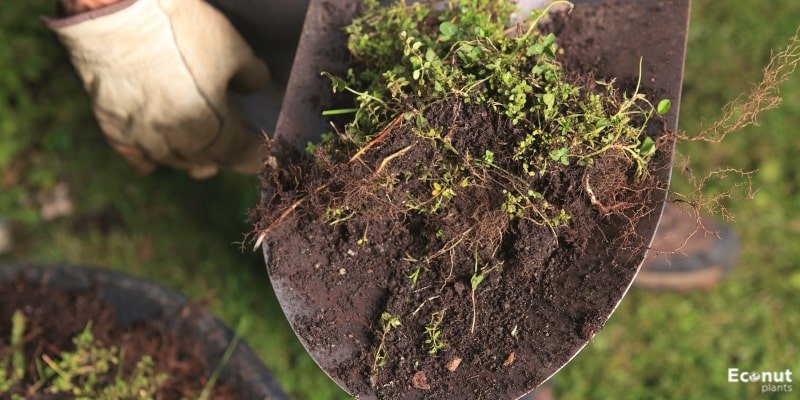
The battle to keep weeds out of your garden can seem never-ending. Not only can trailing nasturtiums, marigolds, chives, and basil form great weed barriers surrounding your tomatoes, but they also help keep pests away!
This would suggest that, on paper, it would be quite an effective weed barrier! Without oxygen or water, weeds cannot flourish. This is accurate; however, it’s clear that your tomatoes have this problem. Whether or not weeds grow is inconsequential if your behaviour kills your tomato plants.
Makes Good Mulch
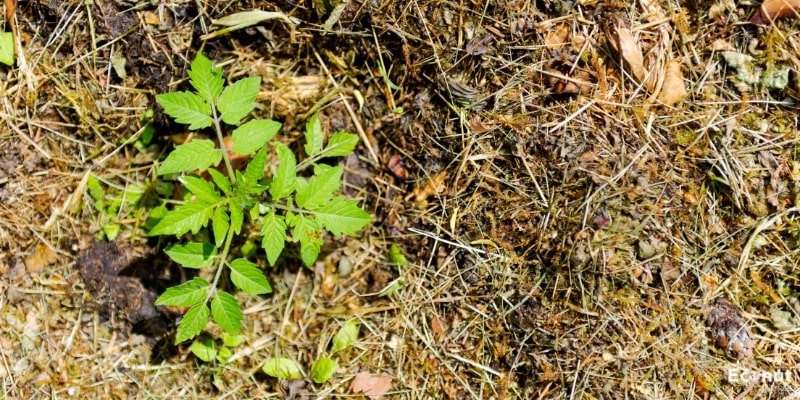
In your garden, mulch is vitally important. It is especially important around and on tomato plants. In addition to protecting soil from extreme heat and preventing water splashback, mulch also deters weed growth. Coffee should come out on top! Mulching your garden with 1-2 inches of coffee grinds can make matters worse rather than better.
Those hardened grounds keep water from reaching the soil and your tomato roots, not aiding in the earth’s ability to hold water. In addition to causing problems with soil aeration, a thick covering like this might suffocate your plant’s roots.
Prevents Fungal Disease
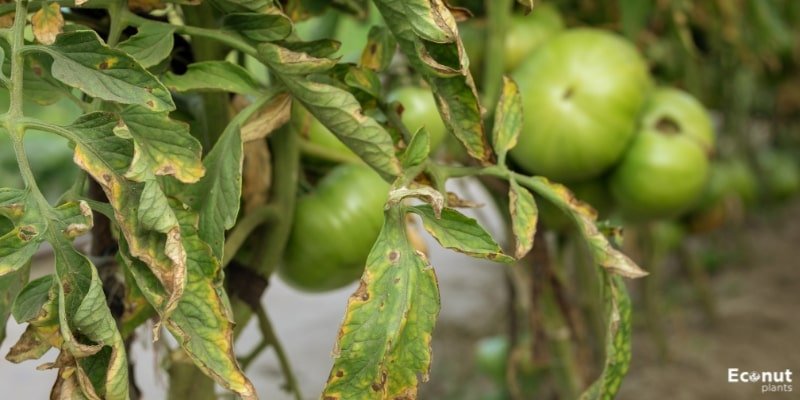
Your tomato plants may suffer greatly from fungal diseases. Usually, the illness is well established by the time symptoms such as yellowing or curling of the leaves appear. If not detected in their early stages, many diseases are lethal to plants.
Caffeine concentrations in coffee grinds are just not conceivable. Though your results won’t be the same as the studies, you might be able to improve the overall health of your soil by composting it or adding amendments.
Similar to this study, other research has examined how certain soil amendments boost microbial activity in your soil, which in turn reduces the incidence of fungal illnesses. Therefore, even if the results were positive, it is unknown how they will affect other plant species or other fungi-related illnesses.
Deters Pests
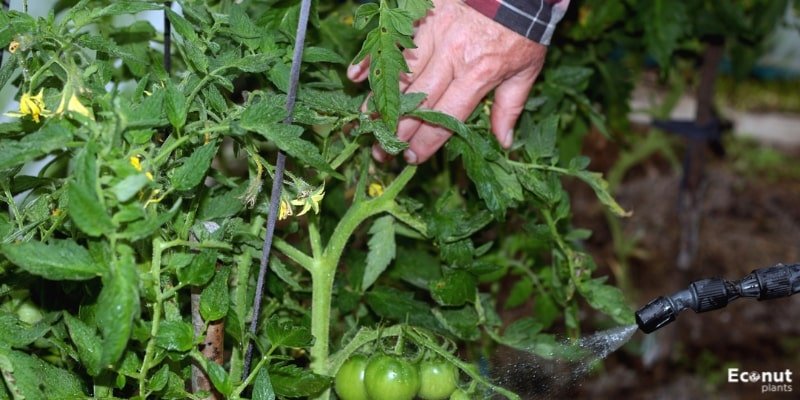
A 2002 study by the University of Nebraska examined the efficacy of caffeine as a repellant for slugs and snails. They found that concentrated caffeine becomes a lethal neurotoxin for the bugs at certain dosages. If you surround your plants with earth, slugs and snails will simply roll over them and eat all of your gorgeous tomatoes.
Moreover, there’s little evidence that they deter other tomato pests like aphids, flea beetles, or white flies. You’ll be far better off concentrating on treatments that are specific to that particular insect if your goal is to scare off pests or get rid of an infestation. You might try planting your tomatoes with companion plants as an extra-natural deterrent.
Let’s Compost!

Now let’s discuss composting. For a compost pile to decompose properly and supply your plants with the necessary nutrients, it must include a specific ratio of carbon to nitrogen compounds.
They are categorized as “green materials” (high in nitrogen), along with eggshells, grass clippings, and leftover food. Brown materials like autumn leaves, straw, and shredded paper supply the second half of the composting equation.
These materials are high in carbon. Coffee grounds can make up as much as 20% of your compost pile, as a general rule of thumb.
Benefits of Traditional Fertilizer vs. Coffee Grounds
Coffee grounds only contain two percent nitrogen and trace levels of phosphate and potassium. It takes weeks or months for the grounds to decompose sufficiently to release these nutrients into the soil.
Applying a balanced NPK fertilizer a few times during the growth season is beneficial to most tomato plants. Avoid using fertilizers with high nitrogen (N) content, as they will cause excessive leaf growth and lower fruit yields.
Enough potassium and phosphorus are beneficial to fruit sugar and acid content. Properly fertilized tomatoes yielded higher levels of red lycopene and other health-promoting carotenoids, which are essential for human nutrition. Provided with the right nutrients, the plants will produce tasty tomatoes with enhanced flavour and beauty.
Conclusion
The gardening community is full of myths, and many of them revolve around common items like Epsom salt, eggshells, and coffee grounds. I hope you found this post helpful in figuring out the best way to incorporate coffee grounds into your garden.
When in doubt, it’s always best to compost. It’s a guaranteed method of turning what would otherwise be trash into a treasure trove of nutrients. Happy gardening!
FAQ
Do tomato plants like eggshells and coffee grounds?
Eggshells and coffee grounds added to the soil surrounding tomato plants do not protect the plants from illness or insects. Eggshells and coffee grinds are the only things that grow better in the compost pile for tomato plants. Over several months, as their nutrients break down, the soil becomes richer.
How many times can I put coffee grounds on my tomato plants?
Before planting tomatoes, sprinkle a small amount of coffee grinds into the soil; this will not damage the plants. But don’t add any more coffee grinds to the soil while it’s still growing. The caffeine residues in discarded coffee grounds stop plants from germinating and growing.
Which plants should I not dust coffee grounds on?
Growing broccoli, leeks, radish, viola, and sunflowers with leftover coffee grounds resulted in decreased growth in all soil types, regardless of the amount of fertilizer applied.
Coffee grounds may cause issues when added to soil intended for alkaline plants, such as lilacs and lavender, due to their low acidity. The caffeine in coffee grounds may be detrimental to some plants, such as geraniums.

